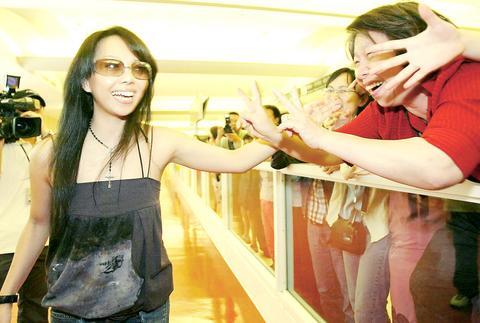Taiwanese pop diva Chang Hui-mei (張惠妹), better known as A-mei, was forced to cancel a performance in China on Saturday night due to a protest by students from Zhejiang University (浙江大學) who accused her of being a supporter of Taiwan independence.
She was scheduled to promote the Master Kong brand of Wei Chuan Food Corp (

PHOTO: TONY YAO, TAIPEI TIMES
At a press conference held by Wei Chuan, Taiwan's second-largest food company, several hundred students raised banners reading "Safeguarding our motherland and unification" (
Faced with student anger, event organizers kept A-mei from the stage.
Days before the event, more than a thousand students from Zhejiang University signed an online boycott of A-mei, expressing discontent with the provincial government for allowing a pro-independence Taiwanese singer to make money in China.
This is not the first time China has blacklisted the Taiwanese singer. Four years ago, A-mei came under a Chinese media blackout for singing the national anthem at President Chen Shui-bian's (
Internet discussions on XinhuaNet and the People's Daily Online show that more Taiwanese entertainers have been blacklisted and become embroiled in political storms.
The users of China's two major Internet sources have identified more than 20 "green performers." They singled out pop singers Jay Chou (
Returning to Taiwan last night, A-mei said she respected the right of Chinese to express themselves on the Internet.
"But I hope the situation will not get complex. We entertainment artists are innocent," she said at CKS International Airport in Taoyuan last night.
A-mei said most Chinese fans were friendly and that she planned to continue with her scheduled activities in China.
Taiwanese businesspeople have faced similar problems across the Strait.
China's criticism of Taiwanese tycoon Hsu Wen-long (
A week after the statement came a diatribe on the front page of the People's Daily calling Chi Mei Optoelectronics (奇美) chairman Hsu, also a presidential adviser, an ardent supporter of independence.
"His Chi Mei Corporation prospered hugely in the mainland, yet he is recognized in Taiwan's business community as a key figure of the Taiwan independence faction," the article said.
Chi Mei Corp has plants in Guangdong and Jiangsu provinces and is eyeing operations in Shanghai.
According to Chen Yi-shen (
Chen said Chinese officials have demanded that all pro-independence businesspeople be excluded as candidates for re-election to the association.

The US government has signed defense cooperation agreements with Japan and the Philippines to boost the deterrence capabilities of countries in the first island chain, a report by the National Security Bureau (NSB) showed. The main countries on the first island chain include the two nations and Taiwan. The bureau is to present the report at a meeting of the legislature’s Foreign Affairs and National Defense Committee tomorrow. The US military has deployed Typhon missile systems to Japan’s Yamaguchi Prefecture and Zambales province in the Philippines during their joint military exercises. It has also installed NMESIS anti-ship systems in Japan’s Okinawa

‘WIN-WIN’: The Philippines, and central and eastern European countries are important potential drone cooperation partners, Minister of Foreign Affairs Lin Chia-lung said Minister of Foreign Affairs Lin Chia-lung (林佳龍) in an interview published yesterday confirmed that there are joint ventures between Taiwan and Poland in the drone industry. Lin made the remark in an exclusive interview with the Chinese-language Liberty Times (the Taipei Times’ sister paper). The government-backed Taiwan Excellence Drone International Business Opportunities Alliance and the Polish Chamber of Unmanned Systems on Wednesday last week signed a memorandum of understanding in Poland to develop a “non-China” supply chain for drones and work together on key technologies. Asked if Taiwan prioritized Poland among central and eastern European countries in drone collaboration, Lin

NO CONFIDENCE MOTION? The premier said that being toppled by the legislature for defending the Constitution would be a democratic badge of honor for him Premier Cho Jung-tai (卓榮泰) yesterday announced that the Cabinet would not countersign the amendments to the local revenue-sharing law passed by the Legislative Yuan last month. Cho said the decision not to countersign the amendments to the Act Governing the Allocation of Government Revenues and Expenditures (財政收支劃分法) was made in accordance with the Constitution. “The decision aims to safeguard our Constitution,” he said. The Constitution stipulates the president shall, in accordance with law, promulgate laws and issue mandates with the countersignature of the head of the Executive Yuan, or with the countersignatures of both the head of the Executive Yuan and ministers or

CABINET APPROVAL: People seeking assisted reproduction must be assessed to determine whether they would be adequate parents, the planned changes say Proposed amendments to the Assisted Reproduction Act (人工生殖法) advanced yesterday by the Executive Yuan would grant married lesbian couples and single women access to legal assisted reproductive services. The proposed revisions are “based on the fundamental principle of respecting women’s reproductive autonomy,” Cabinet spokesperson Michelle Lee (李慧芝) quoted Vice Premier Cheng Li-chiun (鄭麗君), who presided over a Cabinet meeting earlier yesterday, as saying at the briefing. The draft amendment would be submitted to the legislature for review. The Ministry of Health and Welfare, which proposed the amendments, said that experts on children’s rights, gender equality, law and medicine attended cross-disciplinary meetings, adding that